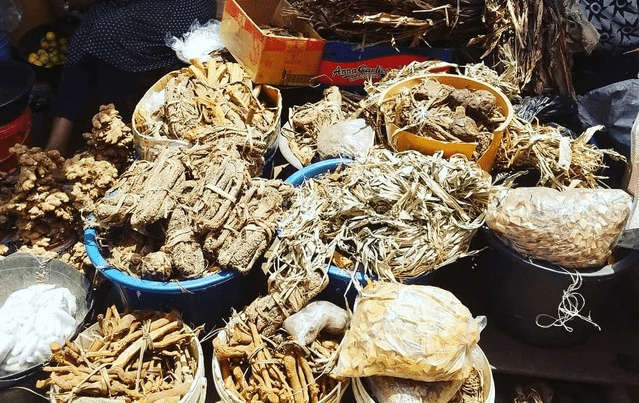‘Nibima’, ‘Taabea’, ‘Adutwumwaa bitters’ among others are highly touted for their antimalarial prowess.
But concerns have been raised about its safety. It is therefore assumed many educated folks would then be deterred from gulping down herbal medicines.
Surprisingly, that is not the case in a joint study by the University of Saarland, Germany and the Kwame Nkrumah University of Science and Technology.
The researchers found that the more educated a person is, the more likely he/she will take herbal medicine.
Malaria is a serious human infection affecting around 228 million people worldwide each year, primarily in African countries such as Ghana.
Caused by the Plasmodium parasite and transmitted by female Anopheles mosquitoes, this disease kills over 400,000 persons each year and impacts heavily on the health of millions, and also on the healthcare systems and economies of the countries affected.
Malaria can be treated with artemisinin-based combination therapies and, indeed, the World Health Organization (WHO) advocates the manufacture, import, stockpiling, distribution, and subsequent application of medicines such as artemether–lumefantrine and dihydroartemisinin–piperaquine in fixed-dose combinations in countries where malaria is endemic.
At the same time, countries such as Ghana, over the centuries, have developed a tradition in treating malaria with locally produced herbal remedies, including branded names such as Taabea or Time Herbal Mixture.
At the same time, countries such as Ghana, over the centuries, have developed a tradition in treating malaria.
The scientists in the study sought to find out personal preferences and applications of antimalarial medicines in Ghana.
For the study over 1,000 questionnaires were distributed in Ghana from January to May 2019.
The findings published in the Journal Sci found around two-thirds of respondents rely on herbal medications.
They again found the more educated a person is, the more likely he is likely to take herbal medications.
Among the respondents, only 31 % preferred Orthodox medications.
Interestingly, 36.8 % preferred locally-produced herbal remedies and 32.2 on a combination of both.
“Even the educated, those at the tertiary level patronized herbal medications.
“The higher the education, the higher the chances of choosing herbs. They didn’t care about the side effects or the cost,” Prof. Anto Berko of the Department of Pharmacy Practice said.
One of the collaborators, Prof. Jacob Claus from the University of Saarland who was surprised at the findings, was worried about the likelihood of contamination and uncertainty of the active ingredients among others.
He would have wished the citizenry relied on scientifically-tested medications.
“It was a little bit surprising that many people would go for herbal medications,” he noted.
The scientists again found virtually all respondents were influenced by advertisements through channels like TV, radio and even billboards on the streets (99.9%)
This was followed by friend’s recommendations, pharmacy prescription and drug peddlers.
“The level of advertisement is huge. In a day, you can have a lot of adverts. No matter your beliefs, if you’re being bombarded with a product, you’re likely to go for that product,” Prof. Berko said.
Lead Scientist, Prince Yeboah of the University of Saarland believes it is about time, attention is placed on refining herbal products to ensure safety from their suspected disadvantages.
“This may provide a refinement of the most active mixtures,” he said.
Professor Claus also encouraged more technological investments into the production of herbal medications.
“The herbal medicine will play a major role as long as we invest a lot of technology into them by producing them in a cleaner and reliable way,” he said.
Latest Stories
-
MGL visits Dumor family following passing of Mawuena Trebarh
10 mins -
In Pursuit of Peace and Unity: Interfaith Leaders Promote Dialogue – Chief Doli-Wura to Africa Union
32 mins -
TEWU raises concern over quality of food served in SHS
1 hour -
Ghanaian students gear up for Robotics World Championship
2 hours -
Political interference makes public sector managers appear incompetent – Dr Manteaw
2 hours -
Police arrest truck driver alleged to have caused train crash
2 hours -
CAF Confederation Cup: Dreams FC depart to Cairo ahead of semis first leg against Zamalek
2 hours -
Liverpool exit Europa League despite 1-0 win over Atalanta
2 hours -
Roma beat Milan to set up Bayer Leverkusen clash in Europa League semis
2 hours -
Mohammed Kudus’ West Ham suffer Europa League elimination
2 hours -
Madam Joyce Oparebea Mintah Addae
3 hours -
Fiscal deficits and debts to remain high over medium term – IMF
3 hours -
Kenyan military chief among 10 people killed in helicopter crash
3 hours -
Insinuating Bagbin is not heeding calls for recall because he is NDC unfounded and unfortunate – Parliament
5 hours -
Ashanti, Nelly are engaged and expecting a baby
6 hours

